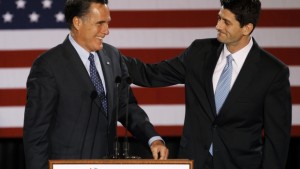 After two unaccustomed weeks away from writing on this site, I return with some observations about the shortened, but effective Tampa convention. The primary one is that Mitt Romney completed a phase in which he has strengthened himself without having to accumulate unnecessary risk: unlike George H.W. Bush, whose bid to inject energy into the Republican ticket saddled him with Dan Quayle, or John McCain, whose move to exploit Barack Obama’s residual weakness with working class white females prompted him to gamble on Sarah Palin, Romney’s selection of Paul Ryan has added a needed reservoir of boldness with a downside that has proved, so far, to be minimal: two weeks of hammering from Democrats have not had measurable negative impact (the comparably weak favorability numbers for Ryan have much more to do with the hyper polarized climate than the partisan knock-up of his budget proposals) on Romney’s standing. Nor, given Ryan’s deftness so far, the ample experience he has defending his proposals, and the compromised hand Democrats hold on Medicare, is there much reason to fear that the upcoming debate between he and Joe Biden pose more danger than opportunity.
After two unaccustomed weeks away from writing on this site, I return with some observations about the shortened, but effective Tampa convention. The primary one is that Mitt Romney completed a phase in which he has strengthened himself without having to accumulate unnecessary risk: unlike George H.W. Bush, whose bid to inject energy into the Republican ticket saddled him with Dan Quayle, or John McCain, whose move to exploit Barack Obama’s residual weakness with working class white females prompted him to gamble on Sarah Palin, Romney’s selection of Paul Ryan has added a needed reservoir of boldness with a downside that has proved, so far, to be minimal: two weeks of hammering from Democrats have not had measurable negative impact (the comparably weak favorability numbers for Ryan have much more to do with the hyper polarized climate than the partisan knock-up of his budget proposals) on Romney’s standing. Nor, given Ryan’s deftness so far, the ample experience he has defending his proposals, and the compromised hand Democrats hold on Medicare, is there much reason to fear that the upcoming debate between he and Joe Biden pose more danger than opportunity.
Second, the most obvious vulnerability for Republicans heading into Tampa—that the party’s more hard edged social conservatism might spill too much into view—never materialized. Ironically, had Missouri Senate candidate Todd Akin not imploded a week earlier over his tone-death, primitive case against a rape incest exception to an abortion ban, the Republican platform’s own hard line might have garnered more withering scrutiny. Instead, the swiftness and intensity of the Republican blowback against Akin cast one obscure candidate rather than a platform plank as the extreme element in the abortion wars, offering Romney and his party an opportunity to isolate the far right rather than being crowded by it.
Third, Condoleezza Rice’s elegant speech the convention’s second night, marking Rice’s evolution from respectful neutrality to forceful opposition to Obama, was the most significant defection on stage last week—and that is no false modesty on my part. The relatively apolitical Rice’s evisceration of Obama’s tentativeness on the diplomatic stage (as opposed to his assertiveness in marshaling American power in unilateral contexts like the campaign against terror networks) couldn’t be diminished with ad hominem attacks. The surest sign of her impact: the fact that Democratic commentators like Chris Matthews were reduced to coopting the moment by praising its substance and making a mountain out of her failure to call Obama’s name.
Fourth, Marco Rubio’s tour de force address preceding Romney may not have been classic introduction fare, but it signaled that the Florida senator could conceivably dominate the landscape in the next few years in the event of a Romney defeat in a way that resembles George W. Bush’s meteoric ascension in the late Clinton years: like Bush, and unlike Romney, John McCain, or Bob Dole, Rubio seems capable of assembling a front-runner’s coalition that is comprised of grassroots activists as well as establishment donors and operatives. For all of Chris Christie’s brilliance as a conservative reformer in an unpropitious environment, and Paul Ryan’s bona fides as a fiscal truth-teller, it is Rubio whose rhetorical narrative seemed to most energize the delegates. The template is one that could prove enormously appealing if the party’s aspirations shift to reconnecting conservatism to both imagination and boldness, as opposed to austerity. (It will help that unlike Christie, he will not face the peril of a reelection prior to 2016, and unlike Ryan, will not be in any way accountable if the ticket ends up losing.)
Lastly, the message discipline in Tampa is unlikely to be matched, or even attempted, in Charlotte this week when the Democrats gather. There are far too many scalps for the practitioners of Democratic identity politics to wave—from a policy coup against the Catholic church over contraception, to the emergence of same sex marriage as a threshold criteria of liberalism, to the burgeoning left-wing economic populism. The best case for Republicans is that Charlotte is a festival of priorities that look to swing voters like either distractions, or the updated version of slowing the rise of oceans and healing planets.
In any case, it is inconceivable that the Democratic convention will be one sustained defense of how 8 percent plus unemployment trumps the alternative, or why growth just north of 1 percent is a basis for optimism: those are conceits that not even hard-core Democrats hold. Also, in a party that is intent on revamping the civil and economic culture, the most potent liberal fantasies are no longer about Barack Obama.
(Cross-posted, with permission of the author, from OfficialArturDavis.com)










Leave a Reply